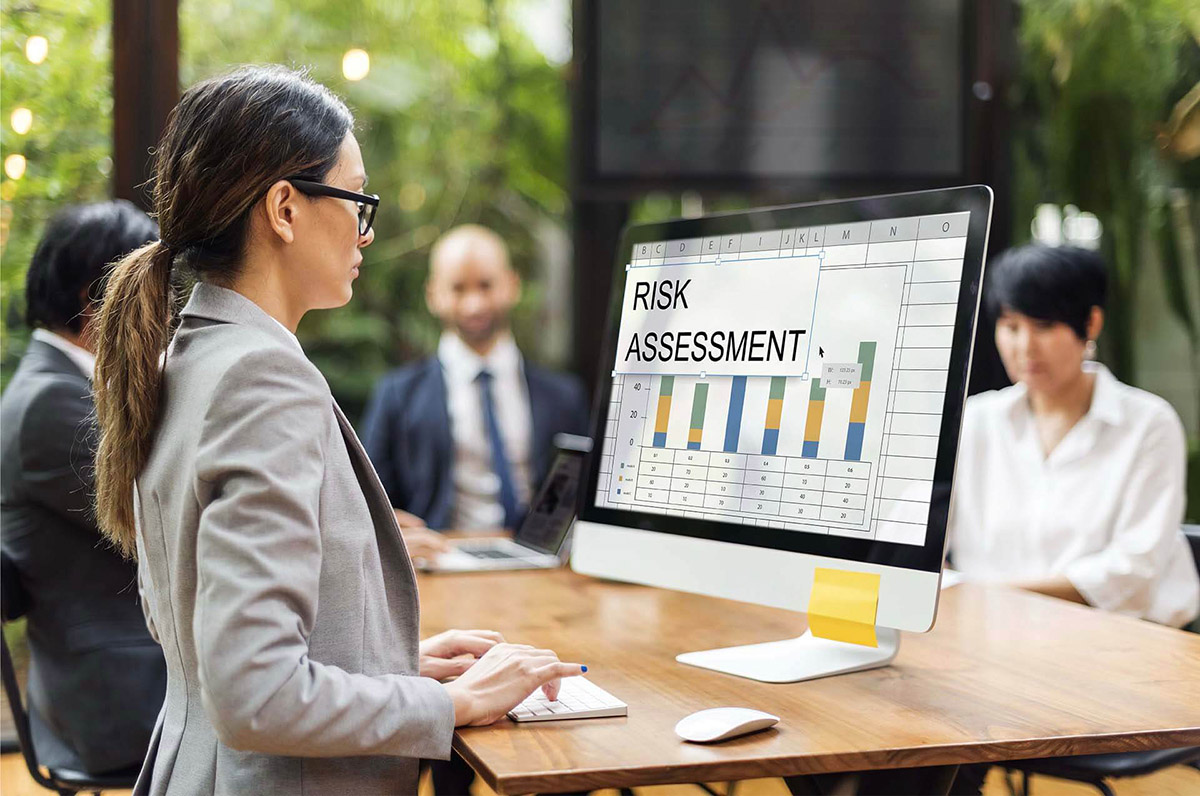

Finance
How To Become Financial Risk Analyst
Modified: December 30, 2023
Looking to break into the finance industry? Learn how to become a financial risk analyst and take the first step towards a rewarding career in finance.
(Many of the links in this article redirect to a specific reviewed product. Your purchase of these products through affiliate links helps to generate commission for LiveWell, at no extra cost. Learn more)
Table of Contents
- Introduction
- What is a Financial Risk Analyst?
- Education and Qualifications
- Skills and Knowledge
- Steps to Become a Financial Risk Analyst
- Step 1: Obtain a Bachelor’s Degree
- Step 2: Gain Relevant Work Experience
- Step 3: Pursue Professional Certification
- Step 4: Continuously Update and Expand Knowledge and Skills
- Job Outlook and Salary Potential
- Conclusion
Introduction
Welcome to the world of financial risk analysis. In today’s complex and ever-changing financial landscape, businesses and organizations face numerous risks that can have significant impacts on their operations and bottom line. It is the role of a financial risk analyst to identify, assess, and mitigate these risks.
A financial risk analyst is a professional who specializes in evaluating potential risks in an organization’s financial activities, such as investments, loans, and insurance. They are responsible for assessing the likelihood and potential impact of these risks and developing strategies to manage and minimize them. By doing so, they help businesses make informed decisions, protect their assets, and ensure stability and profitability.
Financial risk analysts play a vital role in various sectors, including banking, insurance, investment firms, and corporate finance. Their expertise is crucial in helping organizations navigate the complex financial landscape and make sound financial choices in the face of uncertainty.
In this article, we will explore the path to becoming a financial risk analyst, including the necessary education, qualifications, skills, and steps to embark on this rewarding career. We will also discuss the job outlook and salary potential in this field.
So, if you have a passion for finance and a knack for analyzing risks, read on to discover how you can become a financial risk analyst and contribute to the success and stability of organizations around the world.
What is a Financial Risk Analyst?
A financial risk analyst is a specialized professional who assesses and analyzes potential risks associated with financial activities within an organization. This includes identifying, quantifying, and evaluating risks to develop strategies for risk mitigation and management. Their work is vital for businesses to make informed decisions and protect themselves from potential financial losses.
Financial risk analysts are responsible for analyzing various types of risks that an organization may face, including market risk, credit risk, operational risk, liquidity risk, and regulatory risk. They utilize a range of quantitative and qualitative methods to assess these risks, such as statistical modeling, financial analysis, scenario analysis, and stress testing.
One of the key responsibilities of a financial risk analyst is to identify and evaluate the potential impact of risks on an organization’s financial performance and objectives. By conducting risk assessments and developing risk management strategies, financial risk analysts help businesses navigate uncertainties and make strategic decisions that align with their risk tolerance and goals.
Financial risk analysts work closely with risk management teams, financial managers, and senior executives to provide recommendations and insights based on their analysis. They also play a role in monitoring and reporting risk exposures on an ongoing basis, ensuring that the organization remains aware of potential risks and can take appropriate actions to mitigate them.
To excel in this role, financial risk analysts need a strong understanding of financial markets, regulatory frameworks, and industry trends. They must also possess excellent analytical and problem-solving skills, as well as the ability to communicate complex concepts effectively to stakeholders at all levels of the organization.
In summary, a financial risk analyst is a specialized professional who assesses and analyzes financial risks to help organizations make informed decisions, protect their assets, and achieve their financial objectives. They are instrumental in identifying potential risks, developing risk management strategies, and ensuring the organization’s long-term financial stability.
Education and Qualifications
To become a financial risk analyst, a solid educational foundation is essential. Most employers in this field require candidates to have at least a bachelor’s degree in a relevant field such as finance, economics, mathematics, or statistics. However, some positions may prefer or require advanced degrees, such as a master’s or Ph.D.
During their undergraduate studies, aspiring financial risk analysts should focus on coursework that develops competencies in financial analysis, risk management, statistics, economics, and quantitative methods. This foundation provides the necessary knowledge and skills to understand and analyze complex financial data and assess risks effectively.
While a bachelor’s degree lays the groundwork, obtaining additional certifications or advanced degrees can greatly enhance career prospects in financial risk analysis. Professional certifications, such as the Financial Risk Manager (FRM) or the Certified Risk Professional (CRP), demonstrate expertise and dedication to the field. These certifications require candidates to pass rigorous exams and typically require relevant work experience.
For those seeking advanced degrees, a Master’s in Finance or a Master’s in Risk Management can provide a more specialized and in-depth education in the field. These programs often cover advanced topics such as financial modeling, risk measurement, derivative products, and advanced statistical analysis. Additionally, earning a Ph.D. in finance or a related discipline can open doors to research and teaching positions in academia.
In addition to formal education, aspiring financial risk analysts should actively seek opportunities for practical experience and professional development. Internships or entry-level positions within financial institutions, risk management departments, or consulting firms can provide valuable hands-on experience and industry exposure.
Continuing education and staying up-to-date with industry trends and best practices are also crucial for financial risk analysts. Attending workshops, seminars, and conferences related to risk management and finance can deepen knowledge and expand professional networks.
In summary, a bachelor’s degree in a relevant field is the minimum education requirement for a financial risk analyst. Pursuing advanced degrees or professional certifications, gaining practical experience, and staying current with industry developments are all valuable steps for those aiming to excel in this field.
Skills and Knowledge
To succeed as a financial risk analyst, certain skills and knowledge are essential. These skills and knowledge enable professionals to effectively evaluate risks, develop risk management strategies, and provide valuable insights to organizations. Here are some of the key skills and knowledge areas necessary for a career in financial risk analysis:
- Financial Analysis: Financial risk analysts should possess strong analytical skills and a deep understanding of financial markets. They need to be able to analyze financial statements, assess the financial health of organizations, and identify potential risks and vulnerabilities.
- Risk Assessment and Management: The ability to assess and manage risks is at the core of a financial risk analyst’s role. They need to be able to identify and evaluate risks, quantify their potential impact, and develop strategies to mitigate those risks effectively.
- Quantitative Skills: Financial risk analysts must be proficient in quantitative methods and statistical analysis. They need to be comfortable working with complex mathematical models, conducting scenario analyses, and performing risk calculations.
- Industry Knowledge: Keeping up with industry trends, regulatory changes, and emerging risks is crucial. Financial risk analysts must possess a solid understanding of the industry they are working in and stay up-to-date with market dynamics and developments.
- Communication: Strong communication skills are vital for financial risk analysts. They need to be able to articulate their analysis, findings, and recommendations to stakeholders at various levels within the organization. Effective communication ensures that risk assessments are understood and helps drive informed decision-making.
- Attention to Detail: Financial risk analysis requires a meticulous approach. Analysts must pay close attention to detail when evaluating financial data, conducting risk assessments, and identifying potential vulnerabilities. Accuracy is crucial to ensure reliable risk analysis.
- Problem-Solving: Financial risk analysts need strong problem-solving skills to tackle complex risk-related challenges. They must be able to think critically, identify potential solutions, and adapt their strategies as circumstances evolve.
- Regulatory Knowledge: Understanding relevant regulations and compliance requirements is vital. Financial risk analysts need to stay current with regulatory frameworks that impact the industry and ensure that risk assessments and mitigation strategies align with regulatory expectations.
In summary, financial risk analysts require a combination of technical skills, industry knowledge, analytical abilities, and effective communication to excel in their role. By continuously enhancing these skills and staying abreast of industry developments, financial risk analysts can contribute to the success and resilience of organizations.
Steps to Become a Financial Risk Analyst
Becoming a financial risk analyst requires a combination of education, experience, and continuous professional development. Here are the key steps to embark on this career path:
- Obtain a Bachelor’s Degree: Start by earning a bachelor’s degree in a relevant field such as finance, economics, mathematics, or statistics. This foundational education provides the necessary knowledge and skills to understand financial markets and analyze risks.
- Gain Relevant Work Experience: Seek internships or entry-level positions in financial institutions, risk management departments, or consulting firms to gain practical experience. This hands-on experience helps develop crucial skills and provides exposure to real-world risk analysis scenarios.
- Pursue Professional Certification: Consider obtaining professional certifications to enhance your credentials and demonstrate expertise in financial risk analysis. Certifications such as the Financial Risk Manager (FRM) or the Certified Risk Professional (CRP) are highly regarded in the industry and can boost your career prospects.
- Continuously Update and Expand Knowledge and Skills: Stay informed about industry trends, regulatory changes, and emerging risks by pursuing continuous professional development. Attend workshops, seminars, and conferences related to risk management and finance to deepen your knowledge and expand your professional network.
- Develop Strong Analytical and Quantitative Skills: Focus on honing your analytical and quantitative abilities, as financial risk analysis requires proficiency in data analysis, statistical modeling, and risk calculations. Stay current with industry-standard tools and techniques for risk assessment and management.
- Build Effective Communication Skills: Develop strong communication skills to effectively present risk analysis findings and recommendations to stakeholders at various levels within an organization. The ability to communicate complex concepts in a clear and concise manner is crucial for driving informed decision-making.
- Network and Seek Mentorship: Connect with professionals in the field through networking events, industry associations, and online platforms. Seek mentorship from experienced financial risk analysts to gain insights, guidance, and potential career opportunities.
Becoming a financial risk analyst is a continuous journey of learning and professional growth. By following these steps, you can position yourself for success and advancement in this exciting and challenging field.
Step 1: Obtain a Bachelor’s Degree
The first step towards becoming a financial risk analyst is to obtain a bachelor’s degree in a relevant field. A bachelor’s degree provides the foundational education and knowledge necessary to understand financial markets, analyze data, and evaluate risks effectively.
When choosing a degree program, consider fields such as finance, economics, mathematics, or statistics. These disciplines provide a solid base for understanding financial concepts, conducting quantitative analysis, and developing critical thinking skills.
During your undergraduate studies, take courses that focus on financial analysis, risk management, statistics, economics, and quantitative methods. These courses will lay the groundwork for understanding the complexities of financial risk analysis and provide you with the necessary tools and techniques to evaluate risks and make informed decisions.
In addition to the core coursework, consider taking electives that align with your interests and career goals. For example, courses in derivatives, financial modeling, or investment analysis can give you a deeper understanding of specific areas within financial risk analysis.
It’s also beneficial to participate in extracurricular activities or join relevant student organizations to enhance your understanding of the industry and gain practical experience. Consider joining finance or investment clubs, seeking internships, or participating in case competitions to apply your knowledge in real-world scenarios and build valuable skills.
Moreover, consider pursuing additional academic opportunities such as honors programs or research projects. These experiences can provide a deeper understanding of financial risk analysis and showcase your commitment and dedication to the field.
When selecting a college or university, research institutions with strong finance or risk management programs and consider factors such as accreditation, faculty expertise, internship opportunities, and alumni network. A reputable institution can provide valuable resources and networking opportunities that can support your career aspirations.
Remember, obtaining a bachelor’s degree is the foundation of your journey to becoming a financial risk analyst. It sets the groundwork for acquiring the necessary knowledge and skills to excel in this field. However, it’s important to recognize that learning continues beyond the classroom, and gaining practical experience and pursuing professional certifications are also essential steps in your career development.
Step 2: Gain Relevant Work Experience
After obtaining a bachelor’s degree, the next essential step in becoming a financial risk analyst is gaining relevant work experience. Practical experience in the field not only allows you to apply your knowledge but also enhances your understanding of real-world financial risk analysis and hones your skills.
Consider seeking internships or entry-level positions in financial institutions, risk management departments, or consulting firms. These opportunities provide valuable exposure to the day-to-day operations of financial risk analysis and allow you to work alongside experienced professionals in the field.
During your work experience, focus on developing the following key skills:
- Data analysis: Learn to work with complex financial data, conduct quantitative analysis, and perform risk calculations.
- Risk assessment: Gain hands-on experience in identifying and evaluating different types of risks, such as market risk, credit risk, and operational risk.
- Financial modeling: Practice building financial models to assess risk scenarios and analyze potential outcomes.
- Communication: Enhance your communication skills by effectively articulating risk analysis findings and recommendations to stakeholders.
- Collaboration: Take advantage of team-based projects to develop collaboration skills and the ability to work with multidisciplinary teams.
Make the most of your work experience by seeking opportunities to learn from experienced professionals in the field. Ask for feedback, seek mentorship, and take advantage of the knowledge and expertise of your colleagues.
Additionally, networking is crucial during this stage. Attend industry events, join professional associations, and connect with professionals in the financial risk analysis field. Networking can open doors to potential job opportunities, provide valuable insights, and help you stay informed about industry trends and best practices.
It’s worth noting that gaining relevant work experience is an ongoing process. Take advantage of training programs, workshops, and seminars offered by your employer or professional organizations to continually enhance your skills and knowledge in financial risk analysis.
By gaining practical experience and continuously expanding your skill set, you will strengthen your resume and increase your market value as a financial risk analyst. The knowledge and insights gained from real-world scenarios will contribute to your overall proficiency and help you advance in your career.
Step 3: Pursue Professional Certification
Pursuing professional certification is an important step in becoming a recognized and well-respected financial risk analyst. Certification demonstrates your dedication to the field, validates your expertise, and can enhance your career prospects.
There are several professional certifications available for financial risk analysts. Consider pursuing certifications such as the Financial Risk Manager (FRM) or the Certified Risk Professional (CRP). These certifications are highly regarded in the industry and provide a comprehensive understanding of risk management principles and practices.
To earn a professional certification, you typically need to meet certain requirements, including a combination of education, relevant work experience, and passing a certification examination.
The Financial Risk Manager (FRM) certification, offered by the Global Association of Risk Professionals (GARP), is a widely recognized credential for financial risk analysts. To obtain the FRM certification, you must pass a two-part examination that covers topics such as risk measurement and management, financial markets and products, and quantitative analysis.
The Certified Risk Professional (CRP) certification, offered by the Risk and Insurance Management Society (RIMS), is another respected certification for risk management professionals. The CRP certification focuses on a broad range of risk management topics, including risk assessment, risk treatment, and risk financing.
Professional certifications not only enhance your knowledge and skills but also demonstrate your commitment to continuous learning and professional development. They provide a competitive edge in the job market and can open doors to advanced job opportunities and higher salary potential.
Consider preparing for the certification exam by utilizing study materials, attending review courses, and taking practice exams. These resources can help you gain a deeper understanding of the subject matter and increase your chances of success.
Maintaining your professional certification typically requires fulfilling continuing education requirements. Stay up-to-date with the latest industry trends and developments by attending conferences, workshops, and webinars related to financial risk analysis. Engaging in ongoing professional development ensures that your knowledge and skills remain current in an ever-changing field.
Pursuing professional certification demonstrates your commitment to excellence in financial risk analysis and can significantly elevate your professional standing. It showcases your expertise and dedication to employers, clients, and colleagues, making you a more valuable asset in the field of financial risk analysis.
Step 4: Continuously Update and Expand Knowledge and Skills
Continuously updating and expanding your knowledge and skills is a vital step in becoming a successful financial risk analyst. The field of financial risk analysis is dynamic and ever-evolving, requiring professionals to stay abreast of industry trends, changes in regulations, and emerging risks.
Here are some strategies to ensure you are continuously enhancing your knowledge and skills:
- Stay Informed: Subscribe to industry publications, financial news outlets, and risk management journals. Stay updated on the latest developments in financial markets, risk management techniques, and regulatory changes. Engage in discussions and forums to exchange ideas with fellow professionals.
- Attend Training Programs and Workshops: Participate in training programs, workshops, and seminars offered by professional organizations or reputable institutions. These opportunities allow you to gain insights from industry experts, learn new techniques, and broaden your understanding of risk analysis.
- Continuing Education: Pursue additional certifications or advanced degrees to further expand your knowledge and skills. Consider enrolling in graduate programs related to risk management, finance, or analytics to gain deeper insights into the field.
- Networking: Build a strong professional network by attending industry events, joining relevant associations, and connecting with other financial risk analysts. Networking provides opportunities to learn from others, collaborate on projects, and stay informed about industry trends.
- Embrace Technology: Stay up-to-date with technological advancements and tools relevant to financial risk analysis. Familiarize yourself with risk management software, data analytics platforms, and other digital tools that can enhance your efficiency and effectiveness in conducting risk assessments.
- Seek Mentoring and Guidance: Identify experienced financial risk analysts who can serve as mentors and advisors. Their wisdom and guidance can help shape your career path, provide insights into complex risk analysis scenarios, and offer valuable career advice.
- Engage in Professional Communities: Join online forums, discussion groups, and social media groups focused on financial risk analysis. Engaging with professionals in the field can lead to valuable connections, collaborative opportunities, and access to thought leadership.
- Stay Agile and Adaptable: Remain flexible and open-minded in your approach to learning. Embrace new methodologies, techniques, and best practices in financial risk analysis. The ability to adapt and integrate new knowledge and skills into your work ensures you remain effective and relevant in a rapidly changing industry.
By continuously updating and expanding your knowledge and skills, you position yourself as a lifelong learner and a trusted expert in financial risk analysis. This ongoing commitment to professional development will not only enhance your career prospects but also contribute to the long-term success and stability of the organizations you serve.
Job Outlook and Salary Potential
The job outlook for financial risk analysts is favorable, as organizations increasingly recognize the importance of effectively managing and mitigating financial risks. The demand for skilled professionals in this field is expected to grow in the coming years.
One of the major factors driving the demand for financial risk analysts is the evolving regulatory landscape. As financial regulations become more stringent, organizations are placing greater emphasis on risk management and compliance. This creates a need for professionals who can assess and mitigate risks to ensure regulatory compliance.
Additionally, the globalization of financial markets and the increasing complexities of financial instruments contribute to the growing demand for financial risk analysts. These professionals play a vital role in identifying and managing risks associated with international transactions, complex derivatives, and evolving market dynamics.
Another factor impacting job prospects is the increasing focus on data analytics and technological advancements. Financial risk analysts who possess strong quantitative and data analysis skills, as well as the ability to leverage advanced data analytics tools, will have an advantage in the job market.
In terms of salary potential, financial risk analysts are well-compensated for their specialized knowledge and skills. The salary can vary based on factors such as education, experience, industry, location, and the size of the organization.
According to the U.S. Bureau of Labor Statistics (BLS), the median annual wage for financial analysts, which encompasses roles such as financial risk analysts, was $83,660 as of May 2020. However, it’s important to note that salaries can range significantly, with top earners making over $167,420 per year.
The salary potential for financial risk analysts is also influenced by industry and geographic location. Financial risk analysts working in industries such as banking, investment services, or insurance tend to earn higher salaries compared to those employed in government or nonprofit organizations.
Moreover, major financial centers, such as New York City, London, and Hong Kong, often offer higher salary ranges due to the concentration of financial institutions and the higher cost of living in these areas.
As you progress in your career as a financial risk analyst and gain more experience, you may have opportunities for promotions and increased salary potential. Leadership roles, such as risk management directors or chief risk officers, often offer higher salaries and greater responsibility.
In summary, the job outlook for financial risk analysts is promising due to increased regulatory requirements, globalization, and the need for skilled professionals in risk management. The salary potential for financial risk analysts is competitive and can vary based on factors such as education, experience, industry, location, and organizational size.
By continuously enhancing your skills, staying up-to-date with industry trends, and leveraging networking opportunities, you can position yourself for success and advancement in this dynamic and rewarding profession.
Conclusion
Becoming a financial risk analyst is an exciting and rewarding career path for individuals with a passion for finance, analytical thinking, and risk management. It requires a solid educational foundation, continuous professional development, and a commitment to staying informed about industry trends and best practices.
Starting with a relevant bachelor’s degree, aspiring financial risk analysts gain the necessary knowledge and skills to assess, analyze, and mitigate financial risks. Gaining practical work experience in the field further enhances their abilities and provides valuable insights into real-world scenarios.
Pursuing professional certifications, such as the Financial Risk Manager (FRM) or the Certified Risk Professional (CRP), demonstrates expertise and dedication, while continuously updating and expanding knowledge and skills ensures professionals remain at the forefront of the industry.
The job outlook for financial risk analysts is favorable, driven by increasing regulatory requirements, globalization, and the need for skilled professionals to navigate complex financial landscapes. Salaries are competitive, and as professionals gain experience and progress in their careers, opportunities for advancement and higher compensation arise.
In conclusion, a career as a financial risk analyst offers opportunities for growth, challenge, and contribution to organizations’ success and stability. By completing the necessary steps, continuously enhancing skills, and staying informed about industry developments, aspiring financial risk analysts can embark on a fulfilling career in this vital field of finance.














